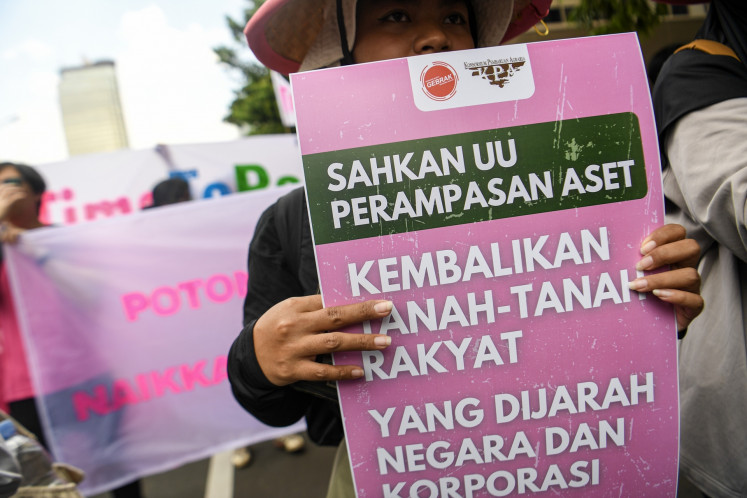Popular Reads
Top Results
Can't find what you're looking for?
View all search resultsPopular Reads
Top Results
Can't find what you're looking for?
View all search resultsFocus Issue: Switching to renewable energies a must in combating climate change
Go with the flow: The Serayu River which originates in Banjarnegara, Central Java, flows to Cilacap regency, covering about 180 kilometers
Change text size
Gift Premium Articles
to Anyone
G
o with the flow: The Serayu River which originates in Banjarnegara, Central Java, flows to Cilacap regency, covering about 180 kilometers. Apart from irrigating paddy fields, part of the moving water is also used to propel turbines of a hydropower plant at the Mrica reservoir and for tourist activities, including water rafting. (JP/Agus Maryono)
All countries have been repeatedly requested to increase their reliance on renewable energy as a solution to the global climate change menace, which has been worsening every year. Indonesia should feel more encouraged to do so as it has abundant resources of renewable energy.
In celebrating World Environment Day on June 5, The Jakarta Post’s Supplement Team is publishing a special edition today with a main focus on renewable energy, hydropower plants and the importance of environmental conservation.
Indonesia cannot deny the fact that the world is growing increasingly aware about the environmental impacts of climate change. Fossil fuels are the biggest contributors of carbon emissions that cause climate change, and so the international call to diversify the world’s energy sources away from environmentally harmful fossil fuels to environmentally friendly renewable energy sources has been growing ever louder.
This international call has been made again and again by the Intergovernmental Panel on Climate Change (IPCC), which was established in 1988 by member countries of the United Nations Environment Program (UNEP) and the World Meteorological Organization (WMO).
The IPCC has regularly produced reports that contribute to the work of the United Nations Framework Convention on Climate Change (UNFCCC), the international treaty on climate change. The UNFCCC was drawn up with a goal to stabilize the atmospheric concentration of greenhouse gases at levels that would prevent dangerous human-induced interference with climate change.
In 2015, the IPCC issued its fifth assessment report, which provided the primary scientific input for the UNFCCC’s 2015 Paris Agreement. In October 2018, the panel issued a report stating that global warming in 2017 had increased 1 degree Celsius from preindustrial temperatures and was rising 0.2 degree Celsius every year. It also projected that global warming would exceed the limit of 1.5 degrees Celsius by 2040.
The UNEP has called on all countries to take concerted efforts to reduce carbon emissions to limit global warming at a maximum threshold of 1.5 degrees Celsius. It is feared that a devastating environmental impact will ensue if global warming reaches 2.0 degrees Celsius. These impacts include vast damage to coral reefs, the extinction of many species, extreme heat waves, multiple harvest failures and higher sea levels that will inundate coastal areas and small islands.
Several regions across the globe have already been experiencing the environmental impacts of climate change, although at a relatively smaller scale. More intense El Niño and La Niña are two such impacts caused as a result of global warming. In Indonesia, the impacts of these weather phenomena have been seen in the rising frequency of forest fires, extreme weather and coral bleaching in several territorial seas.
To avoid devastating environmental impacts, all countries have been urged to switch to renewable energy sources, which are environmentally friendly and can help arrest the increase in global warming. President Joko “Jokowi” Widodo said in Paris in November 2015 during the UNFCCC climate change summit Conference of Parties (COP) 21 that Indonesia was strongly committed to reducing its carbon emissions 29 percent on its own and 41 percent with international cooperation by 2030.
He said that several sectors would be mobilized to achieve emission reduction, including the energy sector. The energy sector would reduce the use of fossil fuels and increase the use of renewable energy to a maximum 23 percent of the national energy mix by 2025.
Unfortunately, Indonesia is still far below its renewable energy target. According to data from the Energy and Mineral Resources Ministry, fossil fuels still dominate the national energy mix. Around 43 percent of the current energy mix is derived from oil fuels, followed by coal (28 percent), natural gas (22 percent) and other fossil fuels (0.8 percent); renewable energy sources contribute only 6.2 percent to the energy mix.
The World Resource Institute (WRI) ranks Indonesia as the world’s sixth largest producer of carbon emissions at 1.98 billion tons per year; the country’s energy sector is the largest producer of carbon emissions. The energy ministry’s data reveals that the carbon emissions output from the energy sector has increased 2.43 percent per year, due to an average increase of 2.35 percent in annual energy consumption. Carbon emissions output is dominated by oil fuels at 64 percent, followed by coal (16 percent), natural gas (12 percent) and liquefied petroleum gas (LPG) at 8.0 percent.
Many people, especially advocates of environmental NGOs, have voiced particular concern over the operation of coal-fired power plants in Indonesia.
Coal is the preferred fuel for power plants, as it is cheaper and relatively easier and faster to develop compared to other energy sources. Despite the fact that many power plants apply supercritical and ultra-supercritical technologies to reduce their impact on the environment, they have been unable to mitigate these impacts to a safe level that will not contribute to climate change.
The high level of fossil fuel consumption in Indonesia will certainly increase the concentration of carbon dioxide (CO2) in the atmosphere, and will in turn accelerate climate change and its devastating impacts in the country. It will only be a question of time before these local impacts spread to cause environmental damage to ecosystems in other regions and to all aspects of human life around the globe.
As matters stand at global and national levels, Indonesia has no other choice but to wean itself from its dependence on fossil fuels and start turning to the increased use of renewable energy sources. Its current use of renewable energy sources is contrary to the fact that the country is blessed with an abundance of renewable energy sources.
Indonesia possesses almost all sources of renewable energy, from hydropower to wind and to solar power, and from biomass to biofuel and to geothermal energy. The government’s data shows that the country currently has a combined installed capacity of 716 gigawatts from its renewable energy power plants.
One of the keys to the increased use and accelerated development of renewable energy sources in the country is to establish a business climate that is conducive to all investors, particularly through bureaucratic reforms and making licensing procedures easier.










